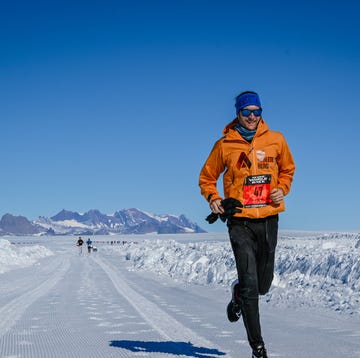As Joseph Henson entered the final straightaway of the Mercedes Half Marathon in Birmingham, Alabama, back in February, he knew he probably should’ve stopped, but the crowd kept pushing him on.
For the last four miles of the race, he started feeling his heart flutter—like palpitations—but didn’t think anything of it at first. But it kept getting worse, and by the time he hit the end, he started feeling very strange.
After he crossed the finish (in 2:18:21), he told his brother he felt like he was going to pass out. That’s the last thing he remembered.
He found out later that he actually went into cardiac arrest.
things like weakness, muscle soreness, dark urine, or more seriously, kidney injury Runner’s World All About 75 Hard half marathon with his brother, who was coming in to town for the race. He trained a fair amount, doing at least two to three runs a week, plus his normal strength training, beforehand.
[Year-Old Running Coach Has Stroke on Treadmill Health & Injuries.]
He came down with the flu the week before the race, but was feeling better the day of, and wanted to complete the race. He felt normal before the race and during his warmup. After the start, he was even on pace to beat his target time.
But around mile 9, things took a turn. He pushed on and made it to the finish about 9 minutes behind his brother. Soon after, he passed out, and went into cardiac arrest—a sudden loss of heart function, which can be fatal.
Luckily, a cardiologist who was running the race happened to finish shortly before Henson. He saw the whole thing, and gave Henson lifesaving chest compressions while race officials called for emergency personnel.
Henson had a foggy memory of waking up in an ambulance with a defibrillator on him—there to deliver a shock if necessary—but he didn’t start really coming to until he reached the hospital.
After getting fluids and an IV to flush his system, doctors were able to help his heart rate return to normal, and he started to feel better after a few hours. He was held overnight for evaluation.
Doctors found that Henson had extremely elevated levels of potassium in his system at the time of cardiac arrest. They believe it was those high levels of potassium, combined with dehydration and a possible case of rhabdomyolysis, that likely caused the cardiac arrest.
Rhabdomyolysis, known as rhabdo, occurs when injury to a muscle cell results in the muscle cell contents leaking into the blood stream, which can cause multiple complications, according to Spencer Nadolsky, M.D., head physician at RPHealth.com. These can include things like weakness, muscle soreness, dark urine, or more seriously, kidney injury.
Rhabdo can be triggered by trauma or injuries, overexertion (this case here), and drugs, Spencer explained.
“In the case of overexertion, the energy demands of the muscle may not have been met. It’s possible that the risk increases with dehydration as well,” Spencer said. (Henson said he was drinking enough water for a normal day, but likely not a sufficient amount for a race day.)
Additionally, high potassium levels could cause a cardiac arrhythmia and arrest, according to Spencer.
Henson has been cleared for exercise again. He’s been running, and plans to continuing doing so, though he is still undergoing tests to pinpoint the exact cause of his cardiac arrest (It’s possible that a condition called Brugada syndrome—a potentially life-threatening disorder that disrupts the heart’s rhythm—can mimic the signs of rhabdo, so doctors want to make sure that he does not have that).
“My takeaway from all of this is it can happen to anybody, I’m pretty young for cardiac arrest and consider myself pretty fit,” Henson said. “I mean, just emphasize importance of training and taking health seriously.”














